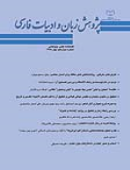دلیل نگارش آثار منثور فارسی از دیدگاه نویسندگان آنها
محورهای موضوعی : پژوهشهای ادبیات کلاسیک ایرانحسین حسنپور آلاشتی 1 * , احمد خلیلی 2
1 - دانشگاه مازندران
2 -
کلید واژه: آثار منثور فارسی دیباچه دلایل تألیف,
چکیده مقاله :
در طول تاریخ زبان فارسی، نویسندگان بزرگی ظهور کرده اند و آثار گوناگونی برجای نهاده اند. از حدود قرن چهارم هجری که آثاری از نثر فارسی به جای مانده است تا به امروز، کمتر موضوعی از مسائل حکمی، کلامی، عرفانی، ادبی، علمی و... است که در آن زمینه، کتاب یا کتاب هایی نوشته نشده باشد. در ديباچۀ اين آثار، علاوه بر ارائة اطلاعات گاه به گاه از نويسنده، هم عصرانش، محتواي كلي اثر و... غالباً از ضرورت و سبب تأليف سخن به ميان مي آيد که در شرحي کوتاه، انگیزه و دلیل نگارش آن به نوعی توجیـه و تعلیل مي شود. سؤال اصلی جستار حاضر این است که «دلیل واقعی تألیف این آثار از دیدگاه نویسندگان آنها چیست؟» نویسندگان با بررسی یکصد و پنجاه اثر از معروف-ترین آثار منثور فارسی در موضوعات و ژانرهای مختلف، به داده هایی دست یافتند و آنها را در چند دسته طبقه بندی کردند. حاصل کلّی آن است که بیشتر این آثار به دستور یا درخواست کسی نوشته شده و کمتر بنا بر عزم و خواست خود نویسنده بوده است. این امر بیشتر دلایل شخصی، اجتماعی، اقتصادی و حتّی سیاسی داشته است که سعی شده در این پژوهش به این چرایی ها و دلایل آن پرداخته شود.
There were lots of great author along the history of Persian Language who inherited different kinds of works. From 4th Hegira up to nowadays that lots of prose texts has been composed there are few, if any, subjects in philosophical, theological, mystical, literary and scientific that we cannot find some book(s) about. There are some information in the introduction section of these books about author and its contemporaries, general information about the work itself and so on; moreover, there would be some information about the necessity of the work composition that would explain and justify its goals and composition reason in a brief and comprehensive manner. The main question in the current study is that what is the real reason of composition of these works in their authors' view? Authors have gained some piece of data after reviewing 150 works from the most famous Persian prose works in different subjects and genres and divided them into different categories. The general result is that most of these works were written due to the order or request of someone and few, if any, works have been written due to the author's own decision and motive. This issue has often been rooted in personal, social, economic and even political reasons that this article tries to deal with and shed light on its causes.

